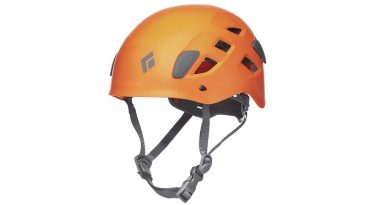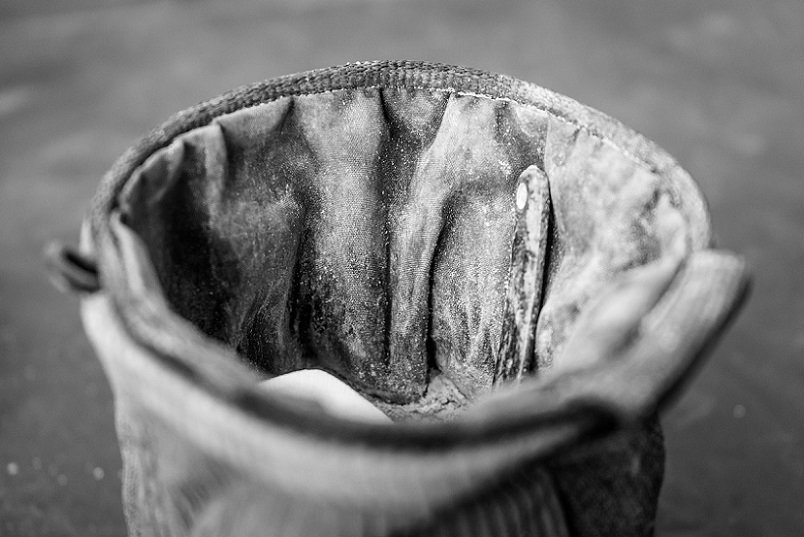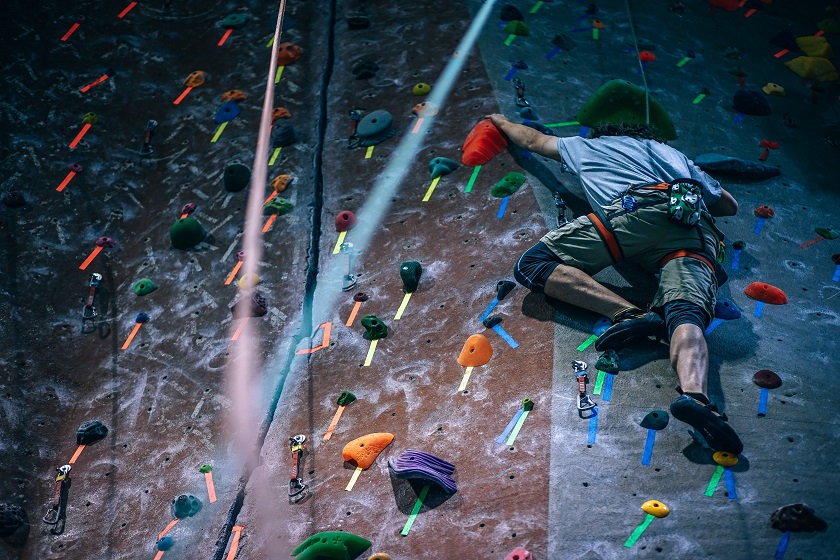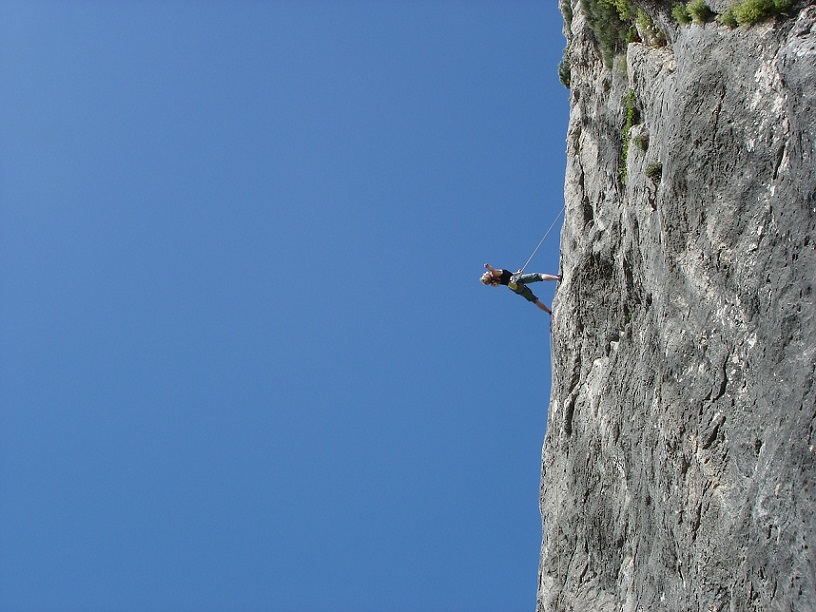When selecting your rock climbing gear, it can be easy to overlook your shoes.
And even those who do invest in rock climbing shoes often fail to take proper care of them.
Cleaning and maintaining proper care of your rock climbing shoes can affect your climb in more ways than one.
That’s right—it’s not just stinky shoes you have to worry about.
Making sure that your shoes are properly cleaned can have important implications for your safety, too.
But take it from me: cleaning your shoes the right way takes a little research.
The good news is that I’ve done it for you already. Below, I’ve compiled everything you need to know about how to properly clean your rock climbing shoes for a safer and more fun climbing experience.
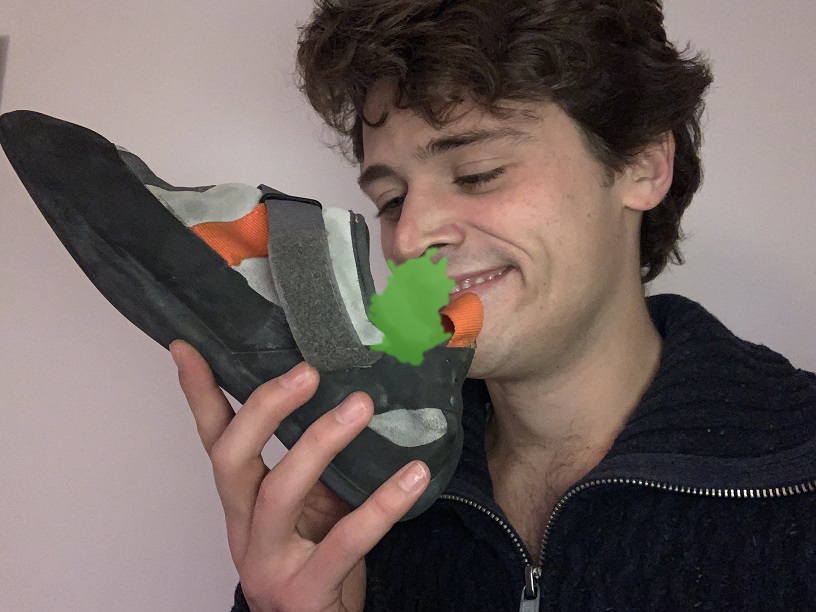
Why Should You Clean Your Shoes?
First, let’s take a moment to talk about why cleaning your shoes is so important.
The most important reason comes down to safety.
As you rock climb, your shoes will slowly begin to collect dirt in the grooves on the bottom of the shoes—and this can eventually lead to them losing their grip.
Cleaning your shoes regularly can help protect you from slipping while making your climb.
Additionally, it’s simply more hygienic.
Rock climbing is a highly-active exercise—meaning that your feet are going to sweat. This sweat will begin to collect in your shoes, giving them a bad odor and even putting you at risk of getting fungus (athlete’s foot).
Unfortunately, cleaning your rock climbing shoes isn’t the same as cleaning those designed for everyday wear.
So not only are they more important to keep clean, they’re also more difficult.
Take special care of the instructions below so that you can properly clean your rock climbing shoes and prevent against unnecessary accidents and odors.
How to Clean
Let me tell you a secret:
It’s easier to keep your shoes from getting dirty than it is to clean them.
While it’s true that everyone’s shoes will need washing from time to time, you can take precautions that can keep your shoes fresher, longer.
This means that you don’t have to worry about washing them quite so often.
Before we look at how you can wash your shoes, let’s take a look at how you can prevent them from getting bad in the first place.
1. Wash Your Feet
Make sure that your feet are clean and dry before putting them in your shoes. If you’re not wearing socks, this is especially important, as bacteria from your feet can enter into the shoes. Additionally, if you’re rock climbing without socks, your sweat and other bacteria can get into the shoes and cause fungus.
Fungi love moisture, so making sure that your feet are dry when you put on your shoes can help keep you from getting Athlete’s Foot.
2. Store Your Shoes in an Open Space
For this reason, it’s also important that you’re not storing your shoes in tight spaces.
Here’s the deal: when you’re climbing, your feet are going to sweat.
A lot.
This will leave your shoes wet and make them the perfect breeding ground for bacteria.
By constantly keeping your shoes in dark, enclosed spaces, you’re keeping them moister, longer—which means more bacteria has a chance to grow.
By letting your shoes dry in the open, you’ll keep the moisture to a minimum.
3. Take Them Off Between Climbs
Just because you’re on your climbing trip doesn’t mean that you have to wear your climbing shoes the whole time. If you’re not climbing, consider taking your climbing shoes off so that they have time to air out.
This can decrease the moisture and help them smell better.
4. Use Air Fresheners
If you notice that your shoes are starting to smell, you can take other steps in addition to the ones above.
Deodorizing powders, for example, can help eliminate even the toughest of odors from your shoes—just make sure that they’re safe for contact with human skin.
But let’s say that you’re past the point of preventative care. What do you do then?
Is there a way that you can clean your shoes, or will you have to start over and get a brand new pair?
The answer is one that you’ll probably be only half-way relieved to hear.
The good news is that, yes, there is a way you can wash your shoes.
The bad news is that this time-consuming process will involve effort on your part.
It’s incredibly important that as you clean your rock climbing shoes, you’re not wearing down on the materials, including the rubber. You’ll also want to consider the materials they’re made out of. Are they synthetic, for instance? Nylon?
Once you’ve figured this out, keep the following washing tips in mind.
1. You’re Going to Hand Wash Them
The primary and most-effective form of washing rock climbing shoes is to wash them by hand. In order to get this done, you’re going to need the right equipment: a bucket, water, and a brush.
2. Use Warm Water
As you begin the process of washing your shoes, make sure that you’re filling the bucket with only warm water. You want to avoid any harsh chemicals or anything that could damage the material of the shoes.
If you’re concerned about killing bacteria and removing as much dirt as possible, it’s okay to add mild detergent. Just be careful that you’re not overdoing it because too much can damage your shoes.
3. Air Dry
After using a brush and your cleaning solution to give your shoes a detailed clean, hang them out to dry. Don’t throw them in the dryer, as the heat can shrink and damage the shoes.
Instead, hang them to be dried in the sun. Make sure that you check the weather before washing your shoes—you wouldn’t want to wash them only for it to rain when you need to dry them.
Make sure that once your shoes are clean that you wipe them with a wet rag to clean them after every climb—and that you properly dry it afterwards. This can help prevent the event of debris buildup.
Frequently Asked Questions: Cleaning & Washing Climbing Shoes
With this information, you have the basic knowledge you need to start cleaning your rock climbing shoes.
However, it’s likely that you still have many questions regarding the topic.
That’s why I put together ten of the most common questions people have about washing their rock climbing shoes.
Refer to this guide below so that you can keep your shoes in the best shape possible.
1. Can I Wash My Climbing Shoes in the Washing Machine?
Though being able to wash rock climbing shoes in the washing machine would make our lives easier, it’s not exactly recommended.
Because washers can be unpredictably-rough, it’s hard to say that your shoes won’t get damaged during the wash cycle.
For this reason, most rock climbers prefer to have their shoes washed by hand so that they can help prevent against accidents.
Additionally, because you’re looking to get the shoes cleaned in as fine detail as possible, you have more control over getting dirt from tough-to-reach areas if you do it by hand.
If you’re bent on washing your shoes in the washing machine, however, it’s not impossible.
Some rock climbers have found success by putting their shoes in the washing machine on a gentle cycle. Make sure that the water is warm and that you’re not using especially-harsh detergents, as these can hurt your shoes.
Finally, no matter what you do, make sure that you don’t dry them. Putting your shoes in the dryer can cause unnecessary damage.
In short, while it’s possible to put your shoes in the washing machine, it’s better if you can find time to do it by hand. Not only is this process safer for your shoes, but it can also help get them cleaner, as well.
You can also use this as an opportunity to inspect the current quality of your shoes and determine if they are too worn to continue using.
2. Will Climbing Shoes Shrink When I Wash Them?
The answer to this question is not as simple as it seems.
While washing your shoes will not cause them to shrink, improper drying methods can.
Even if you’re just throwing your shoes in the washing machine, they should be okay in this regard. Nothing you do at this stage will really cause them to shrink—though you still need to be careful of other possible consequences.
So why the concern about shrinking shoes?
This issue is raised when it comes to drying your shoes.
Have you ever washed and dried a shirt or jacket and found that they were smaller when you pulled them out of the dryer?
The truth is that your rock climbing shoes are similar in this regard and will likely shrink if they are thrown in the dryer.
For this reason, don’t expose your shoes to any unnatural heating source—even a blow dryer.
If your shoes are wet, simply air them out in the sunlight until they are dry. Otherwise, you risk shrinking and deforming your shoes.
3. How Should I Wash My Climbing Shoes?
We’ve seen that there are two methods you should consider when washing your climbing shoes.
But are there any others?
For the most part, no.
While you may find variations that work for you, it’s best to play it safe and stick to the steps as outlined above.
Unless you have shoes made of a different material—such as leather—these tips will work for you.
Whether you choose to wash your shoes by hand or in the machine is up to you, but I want to stress one more time that if you want the best results, you should take the time to wash them by hand.
4. Tips for Washing Leather Climbing Shoes
I can hear you now:
“But what if I do have leather shoes? How would I wash them then?”
Don’t worry. I have an answer for you, too.
For leather shoes, washing them by hand with warm water is your best bet. Leather may be especially sensitive to certain chemicals, so it’s best to wash the leather portions of your shoes with warm water only.
It’s also better to forego a washing machine when cleaning your leather shoes, as you don’t want the material to get damaged.
Some have noted that the biggest differences in washing leather shoes come in how they must be dried.
Like other climbing shoes, you shouldn’t put them in the dryer, as they may become distorted.
Unlike other shoes, however, there are other precautions that you should take in order to make sure that you’re protecting the material.
Namely, you’re going to want to keep your shoes out of a cold environment, too.
Now, I’m not talking about areas that are slightly chilly. I mean full-fledged freezing temperatures.
If your shoes aren’t properly dry and are exposed to freezing weather, it’s possible that the water will freeze and crack the leather.
Once this is done, there’s no way to fix your shoes, so be sure that you’re not exposing your wet leather shoes to dangerous temperatures.
Make sure that you give them an appropriate amount of time to air out and dry before you take them on your next climb—especially if you’ll be going somewhere where the temperatures will plummet.
5. Practices You Should Avoid When Washing Climbing Shoes
As you can see, there are several things that you should avoid when you take on the process of washing your climbing shoes.
These practices are those that could increase the wear and tear of your shoes or even make them unsuitable for further climbing.
By taking this advice to heart, you can help protect your climbing shoes from unnecessary injuries.
- Never heat dry them—I’m putting this here just to emphasize that it’s imperative that you don’t throw your rock climbing shoes in the dryer.
- Don’t use harsh cleaners and other chemicals—You don’t want to use any cleaners that are too harsh on your shoes—especially those that are made from leather. In doing so, you could damage the materials and even make them wear out faster. Trust me, you’d hate to lose a good pair of shoes just because you got a little creative with your cleaner.
- Avoid using hot water—whether you’re cleaning them by hand or in the washing machine, be sure that you’re not using hot water. If it’s too hot, it can start to undue the glue that holds the shoes together. Even if you don’t see noticeable signs of this at first, it can become apparent while you climb—and that’s never what you want to discover while you’re hanging in the air.
- Not using chalk—If you’ve ever been bouldering, you know just how important it is to chalk your hands before certain types of rock climbing. But did you know that chalking your feet can prove a great way to keeping your shoes cleaner, longer?
That’s right! By using chalk, you limit the amount of sweat that’s making its way into your shoes. This helps prevent moisture buildup, cutting back on potential fungus and smells.
6. How Should I Clean Climbing Shoes Between Climbs?
Remember when I said that you should clean your shoes between climbs—even during the middle of your trips?
That’s still true.
By making sure that you’re constantly keeping your shoes clean, you can significantly lengthen the amount of time you can go without giving your shoes a deep clean.
In order to do this, make sure that you’ve got another pair of shoes you can wear while you’re not climbing. You’re also going to want to give your shoes enough time to dry out after you’ve cleaned them.
Do note here that you’re not going to get your shoes soaking wet—just a little damp.
All you have to do is use warm water and a rag to wipe down the outside sections of your shoes. If you wish to use a brush, that’s okay, too.
This isn’t intended to be a full-scale clean—it’s just something that will help cut back on the accumulation of debris while you climb.
7. How Do I Clean Chalk out of Climbing Shoes?
If you’re wondering how to clean chalk out of rock climbing shoes, look no further.
I’ve got the answers—and I think you’ll like them.
Cleaning chalk out of your climbing shoes is one of the easiest parts of the whole process. Simply take your damp, wet rag and wipe around the insides of your shoes.
This will help collect extra dust, powder, and chalk that may be lying in there.
Keep in mind, however, that as you climb, you’ll probably want to keep chalk on your feet in order to counterbalance the sweating that you’ll be doing.
8. How Do I Clean the Inside of My Climbing Shoes?
Cleaning the outside of your climbing shoes is only half the story. And while it can certainly help with the grip and safety of your shoes, it does little to combat bad smells.
In order to do this, you’re going to have to learn how to clean the inside of your climbing shoes.
The good news is that the process is fairly simple.
The goal of cleaning the insides of your shoes is to cut down on smell and fungus-producing bacteria.
For this reason, many prefer to take a cloth damp with rubbing alcohol and pass it over the insides of the shoe.
This natural antiseptic can kill just about every bacteria that’s lurking in your shoes, making it a powerful way to reduce odors.
Keep in mind, however, that you don’t want to rub this alcohol on the outside of the shoes, as this can damage the material.
Also, remember not to use too much alcohol in the inside of your shoes. You just want enough that you can lightly skim the insides to kill bacteria.
Going overboard can leave the inside of the shoe wet far too long and may end up doing more harm than good.
9. How Should You Get the Smell out of Your Climbing Shoes?
Are you looking for how to get the smell out of your climbing shoes?
Don’t worry. You’re not alone.
Because we’re so active in our shoes, it’s no surprise that they develop foul odors quickly.
As common as it is, however, it’s not any less embarrassing when this happens.
While you can cut down on the odor by routinely following the cleaning tips above, you can also take other actions that are specifically-designed to reduce the odor of stinking shoes.
For starters, you may consider buying a foot odor eliminating powder. These are powders that are made specially to put inside shoes that smell.
The best part about them is that they aren’t shoe specific. You can put them in almost anything, and you’ll be immediately able to tell a difference in smell.
Using the alcohol to clean the insides of your shoes will likely work as well, but this method isn’t as popular as putting deodorizing powders inside the shoes.
10. Will a Spray Work?
There are also odor-eliminating sprays on the market that are designed to kill bacteria and leave your shoes smelling fresh.
But do they work?
The answer is yes, but with a catch.
While these sprays do their jobs, they are often less effective than powders for a number of reasons.
For starters, because they leave your shoes damp, they make them more susceptible to bacteria in the future.
Also, they generally don’t add as long-lasting protection as you may want.
Because of this, I recommend only buying spray when in a pinch.
The Bottom Line
Cleaning your rock climbing shoes can help improve your safety and smell.
By following the tips above, you can be on your way to washing your shoes in an effective and safe way that won’t harm the materials.
And trust me: as your shoes begin to feel and smell better, both you and those around you will be glad that you’ve discovered a great shoe-cleaning routine.

